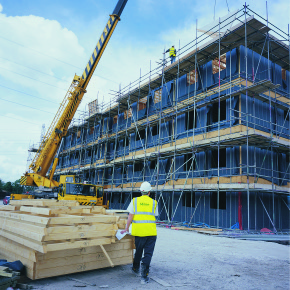
What councils need to build again
Chris Seeley from ARK Consultancy sees exciting opportunities ahead for local authorities to build homes again at scale – but only if they can put in place the right culture, people, skills, tools and partnerships.
The Government’s Housing White Paper at the start of the year held out the appealing prospect of councils getting back into volume homebuilding again, after a generation of being pretty much out of the game. The long-overdue recognition that we simply need to build more homes fast, and the desire to diversify an industry dominated by big, commercial players unlocks the opportunity for local authorities to limber up and show what they can do.
Devolved authorities and those ‘with ambition’ in areas of high housing need will be able to tap into some extra funds for accelerated schemes and infrastructure. But before they sprint back into action, councils need to be clear about what they need in order to build again successfully, in 21st century market conditions.
So what’s on the essential kit list?
Political leadership and stability – with so much uncertainty at national and international level, local politicians have a crucial role to play in securing reliable, long-term commitment to homebuilding. This is too big and important an issue to get thrown off course or into reverse whenever there’s a change of political control. It demands continuing, all-party consensus that council staff and partners can trust.
Campaigns – councillors and executives need to unequivocally make the case for more homes in their areas. This needs to become an overtly populist and shared cause, where the majority is prepared to take on and bargain with those who resist more homes, even in the Green Belt.
Partnerships – even if resources were unlimited, the days of authorities being able to do things entirely on their own are long gone. The municipal instinct may still burn bright (and have its attractions) in some places, but modern housebuilding relies on a complex set of interdependent relationships between diverse specialists. So councils need to get good at working with everyone from land agents, housebuilders, housing associations and institutional funders, to procurement consortia and materials supply chains.
Speed – traditional local government structures, working practices and decision-making are ill-suited to the rapid action needed to deliver accelerated housing supply. It’s encouraging to see many authorities (for example, Cambridge City and Cambridgeshire County Councils) forming special companies and other vehicles to bring a more urgent, commercial mindset and focus. But these need to have real freedom to act and compete with the private sector on level terms.
New products and production methods – while there’s clearly huge demand for affordable homes, councils shouldn’t mistake this for people necessarily wanting what they’ve provided in the past. Large, mono-tenure developments have proved problematic, and what many consumers really desire now is the ability to switch between various types of occupation and ways of paying at different life stages – ideally in the same property. Councils are in a great position to innovate around new tenure options, and boost the viability of off-site manufactured and other quick-build homes, through their combined buying power.
Community-building skills – constructing dwellings is the easy bit. Councils will really be judged on how well they’re able to create and sustain pleasant, thriving communities where people want to stay. The upcoming new generation of garden cities and villages will particularly put this to the test, but it’s important everywhere. Health, education, transport, shops, leisure and other community amenities provide the vital glue to bind new neighbourhoods together.
Jobs and skills – with Britain’s exit from the European Union likely to cause a dip in the availability of skilled construction labour, councils need to act quickly to put training and apprenticeship schemes in place to ensure a viable future workforce. New homes inject money into local economies, so authorities should also make sure their housebuilding programmes directly tackle youth and long-term unemployment in their areas. And they will have to be imaginative about how and where they go to find the necessary programme and technical expertise.
New money and risk appetite – to become major builders again, councils will need to go far beyond the familiar sources of capital finance to fund new homes. This means getting into close and potentially complicated deals with institutional investors and other innovative ways of accessing money, including overseas funds. These carry very different and sometimes significant risks, which are a long way from the old days of the Public Works Loan Board.
All this is, of course, on top of the much bigger and more dynamic roles that councils are now expected to play in identifying housing demand, enabling private development, attracting outside investment, assembling/releasing land and speeding up planning permission.
Encouragingly, the White Paper points out that twice as many council homes were built in England in the past five years, compared to the period 1997 to 2010. But the numbers are currently small – with just over 2,000 council homes completed in England during the year ending 31 December 2016 (less than 1.5 per cent of total output).
A welcome recall to the first-team of the nation’s homebuilders is within the grasp of determined and far-sighted councils who are prepared to invest in all these essentials. Elected authorities are important, long-term guardians of the communities they serve. So at a time of growing national housing emergency, they deserve the chance to revisit and improve on their heritage as builders.
Imagine what 20,000 – or 200,000 – council-built homes each year would do for the country and the prospects of future generations.
Latest news

26th July 2024
Enfield Speciality Doors completes world-class project for Atlas Copco HQ
A rundown office and warehouse building completely transformed into a modern headquarters for Atlas Copco has been fitted with more than 120 internal fire doors from Enfield Speciality Doors.
Posted in Access Control & Door Entry Systems, Articles, Building Industry News, Building Products & Structures, Building Systems, Case Studies, Doors, Interior Design & Construction, Interiors, Posts, Restoration & Refurbishment, Retrofit & Renovation, Security and Fire Protection, Sustainability & Energy Efficiency, Timber Buildings and Timber Products, Wooden products
26th July 2024
Abloy UK launches new white paper
Abloy UK, a leading provider of security and access control solutions, has launched a new white paper.
Posted in Access Control & Door Entry Systems, Architectural Ironmongery, Articles, Building Industry News, Building Products & Structures, Building Services, Doors, Facility Management & Building Services, Health & Safety, Information Technology, Innovations & New Products, Publications, Research & Materials Testing, Security and Fire Protection
26th July 2024
MCRMA Member Profile: David Roy, Director of Roofconsult
David Roy of MCRMA member company Roofconsult has more than 50 years’ experience to draw upon working in the building envelope sector and a unique perspective on how it has changed in that time.
Posted in Articles, BIM, Infrastructure & CAD Software, Building Associations & Institutes, Building Industry News, Building Products & Structures, Building Services, Building Systems, Cladding, Information Technology, Restoration & Refurbishment, Retrofit & Renovation, Roofs, Walls
26th July 2024
Strand: Enhancing Door Functionality and Safety
Craig Fox, Sales Director for Strand Hardware, outlines how door industry professionals might apply door limiting stays…
Posted in Architectural Ironmongery, Articles, Building Industry News, Building Products & Structures, Building Services, Doors, Facility Management & Building Services, Health & Safety, Restoration & Refurbishment, Retrofit & Renovation
 Sign up:
Sign up: